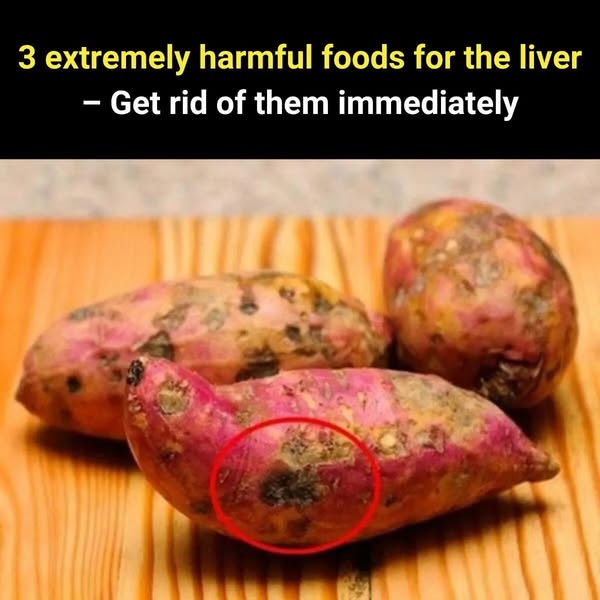3 Extremely Harmful Foods for the Liver – Get Rid of Them Immediately
Identifying and eliminating liver-damaging foods is crucial for protecting your health.
1. Yellowing Peanuts
Most peanuts that turn yellow have already developed mold and taste bitter. These peanuts contain aflatoxins, a toxin that can severely harm liver health.
2. Black-Spotted Sweet Potatoes
Sweet potatoes are a common staple, but if they develop large black spots, they should not be eaten. These spots indicate spoilage, which can be harmful to liver health.
3. Sprouted Potatoes
Even a small amount of sprouted potatoes should be avoided. They contain high levels of solanine, a toxic compound that damages the liver and negatively affects overall health.
7 Daily Habits for a Healthy Liver
1. Maintain a Healthy Weight
Obesity is a major risk factor for liver disease. Excess fat buildup can lead to fatty liver disease and other complications. Maintaining a healthy weight through a balanced diet improves liver function. A body mass index (BMI) of 18.5–22.9 helps reduce the risk of chronic diseases.
2. Avoid Excessive Alcohol Consumption
Heavy alcohol consumption is a leading cause of liver damage. The liver prioritizes breaking down alcohol over other functions, increasing the risk of inflammation, scarring, and long-term harm.
3. Quit Smoking
Dr. Vu Truong Khanh, Head of Gastroenterology at Tam Anh General Hospital in Hanoi, warns that cigarette smoke contains hundreds of toxic chemicals that increase the risk of liver cancer and worsen liver damage. Smoking is also the leading cause of lung cancer. Quitting smoking can improve liver health and lower disease risks.
4. Follow a Healthy Diet
A nutritious diet ensures the liver receives essential nutrients and fiber. Limit foods high in fat, sugar, and salt, as they contribute to liver damage. Reduce intake of refined carbs like rice and bread. Instead, focus on fruits, vegetables, whole grains, protein, and healthy fats.
Dr. Khanh recommends liver-friendly foods such as:
- Green leafy vegetables rich in antioxidants
- Fatty fish with omega-3 to reduce inflammation and improve liver function
- Nuts containing antioxidants and healthy fats to protect liver cells
5. Stay Hydrated
Drinking enough water helps flush out toxins and enhances liver function. Adjust water intake based on body weight and activity level, drinking more when exercising or sweating excessively.
6. Exercise Regularly
Regular physical activity supports liver health by maintaining a healthy weight, reducing inflammation, and improving insulin function. It also burns triglycerides and lowers the risk of fatty liver disease. Aim for at least 150 minutes of moderate-intensity exercise per week, such as brisk walking, cycling, or swimming.
7. Get Regular Health Checkups
Dr. Khanh emphasizes that early-stage liver diseases, such as fatty liver, hepatitis, cirrhosis, and liver cancer, often have no symptoms or may resemble other conditions. This makes them easy to overlook, leading to severe and irreversible liver damage.
Routine checkups, including ultrasounds and liver function tests, allow early detection and treatment. Getting vaccinated against hepatitis A and B as recommended by a doctor can also help prevent liver-related viral infections.



